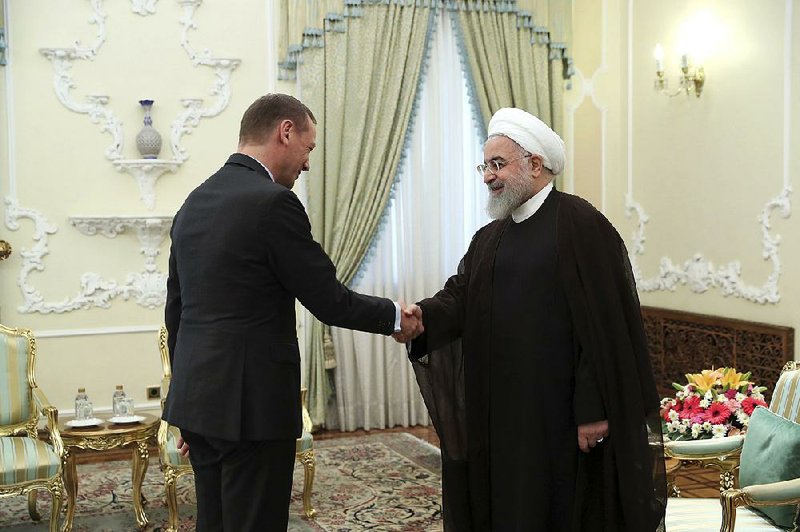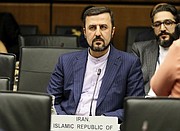The U.S. on Wednesday accused Iran of "nuclear extortion" and threatened further sanctions against Tehran, which has begun stockpiling and enriching uranium beyond the limits set in the 2015 accord that President Donald Trump has abandoned.
The United States called an emergency meeting Wednesday of the International Atomic Energy Agency in Vienna in response to the Iranian moves, while a senior French envoy was in Tehran exploring ways to reopen negotiations on compliance with the deal.
Both Iran and the United States insist that they are open to further negotiations, but both have put different conditions on new talks. Washington insists that they must prevent Iran's development of a weapons program and restrict Iran's involvement with regional allies, while Iran insists that Washington must first rejoin the deal Trump renounced in 2018 and remove sanctions that are strangling Iranian oil exports.
At the Vienna meeting, the American ambassador, Jackie Wolcott, said "there is no credible reason for Iran to expand its nuclear program, and there is no way to read this as anything other than a crude and transparent attempt to extort payments from the international community." The only path to sanctions relief, she said, is "through negotiations, not nuclear extortion."

Later Wednesday, Trump wrote on Twitter that sanctions against Iran would soon be "increased substantially" and claimed that "Iran has long been secretly 'enriching,' in total violation" of the 2015 deal.
It was not clear on what basis Trump made that claim. The International Atomic Energy Agency, which conducts a strict inspection of Iran's nuclear program under the deal, has discovered no secret enrichment program.
Iran's ambassador to the agency, Kazim Gharib Abadi, responded to Trump by saying in Vienna that all of Iran's nuclear activities are monitored by the agency, and "we have nothing to hide."
Abadi stressed that Iran's nuclear program was for "peaceful purposes" and said his country was prepared to resume full implementation of the nuclear deal, "commensurate with the implementation of the commitments by all participants."
At the same time he slammed the U.S. decision to withdrawal from the deal and reinstate sanctions, saying it was "neither legitimate nor legal" and should not be accepted by the international community.
"Due to costly and predictable consequences of sanctions, they should be seen as weapons of warfare and means of aggression," he said. "Economic sanctions are, in fact, collective punishment of the ordinary people, contrary to the objectives and purposes of human rights, and should be considered as crimes against humanity."
He later told reporters that if the U.S. was serious about wanting to negotiate with Iran, it should drop all sanctions.
"No country is ready to negotiate with a country that is putting a gun at its chest," he said. He added, however, that the deal itself was "not renegotiable."
While the State Department sought to marshal support for its "maximum pressure" campaign against Iran, other diplomats criticized Trump for withdrawing from the accord a year ago and reimposing sanctions on vast areas of the oil exporter's economy.
Russian delegate Mikhail Ulyanov fired back at the meeting that the U.S. could not both reject the deal and call for Iran's full implementation of it.
"Although for some reason they only refer to Tehran, in fact the United States, who are refusing to fulfill its own obligations under the nuclear deal, lost any right to demand this from others," he said.
France, Germany and the U.K. issued a joint statement on the eve of the meeting saying that while they were concerned by Iran's violations, it's the job of the remaining participants in the Joint Comprehensive Plan of Action, as the nuclear accord is known, to mediate disputes.
The European Union reinforced that message Wednesday, saying it was also keen to facilitate trade with Iran.
"The EU deeply regrets the U.S. withdrawal and calls on all countries to refrain from taking any actions that impede the implementation of the [Joint Comprehensive Plan of Action] commitments," it said.
BEYOND THE LIMITS
Iran has repeatedly stated that it does not want nuclear weapons. It has moved carefully beyond the enrichment limits of the deal in response to the American reimposition of sanctions and especially Washington's decision in late April to end the waivers it had given eight countries to continue to buy Iranian oil.
The decision was taken against the advice of the State Department, according to a former diplomat, Dennis Ross, who said it favored longer-term pressure on Iran while trying to keep the country inside the limits of the deal. But since the decision, Iran's oil exports, on which much of the economy depends, have fallen from roughly 1 million barrels a day to roughly 300,000.
Iran says it will further increase uranium enrichment and take other unspecified steps that will not be reversed until it achieves "full rights" under the deal. Iran has demanded that the other participants -- Britain, France, Germany, Russia, China and the European Union -- satisfy their obligations to aid Iran's economy.
But U.S. sanctions, which threaten punishment against countries that do business with Iran, have made trade almost impossible.
While China continues to buy some Iranian oil, the Europeans have instead created a barter system for trade that aims to bypass restrictions on dollar-denominated transactions imposed by the U.S. sanctions. But the barter system, known as Instex, has not yet completed its first transaction. And it has been heavily criticized by Iranian officials as no substitute for the surge in business they had expected under the nuclear agreement. Iran's supreme leader, Ayatollah Ali Khamenei, has called Instex "a bitter joke."
The French presidential envoy, Emmanuel Bonne, met Wednesday with key Iranian figures. Ali Shamkhani, head of Iran's national security council, told him that the country's decision to reduce its nuclear commitments "step by step" is an "unchangeable strategy," according to the official Islamic Republic News Agency, and he went on to criticize European countries for their "lack of will" in providing relief from American sanctions.
But Iranian President Hassan Rouhani told Bonne that "Iran has fully left the path open for diplomacy and negotiation," according to the presidential website. Rouhani said Iran seeks "full implementation" of commitments by all parties. "If signatories to the deal implement their commitments, Iran also will take new steps."
Last week Rouhani also said Iran's actions thus far were fully reversible, saying: "All our actions can be returned to the previous condition within one hour."
The diplomatic maneuverings reflected Iran's efforts to pressure the Europeans to deliver more economic benefits and Washington to rejoin the nuclear agreement and lift sanctions. But Iran has not yet said what further actions it may take, though it promises more in early September if conditions do not change.
Iran is producing oil at the slowest clip since 1986. U.S. sanctions have hit the currency, fueled inflation and hobbled growth.
U.S. officials say the squeeze is meant to push Iran to negotiate a broader deal that also limits its missile program and support for proxy militias in the region. But the approach has weakened the hand of Rouhani, who called Wednesday's meeting "ridiculous," and prompted hard-liners to dig in.
"The Americans, on one hand, say the [Joint Comprehensive Plan of Action] was a very bad deal, even the worst deal, and they left it," he was quoted as saying by the official Islamic Republic News Agency. "On the other hand, when Iran diminishes some of its commitments everyone expressed worry."
Iran has continued allowing atomic energy agency inspectors to conduct what Director-General Yukiya Amano calls "the most robust verification system in existence anywhere in the world." The safeguards account for gram-level amounts of enriched uranium to ensure they aren't diverted for weapons. The agreement gave monitors unique powers in Iran, where they called record snap inspections last year.
In other developments, Rouhani said Wednesday that Britain will face "repercussions" over the seizure of an Iranian supertanker last week that authorities in Gibraltar suspect was breaching European sanctions on oil shipments to Syria.
Rouhani called the seizure "mean and wrong" during a Cabinet meeting, the Islamic Republic News Agency reported.
"You are an initiator of insecurity and you will understand its repercussions," he warned the British government, calling for the "full security" of international shipping lanes.
Iranian Foreign Minister Javad Zarif, meanwhile, denied the supertanker belonged to Iran, saying whoever owned the oil shipment and the vessel could pursue the case through legal avenues. Iran had earlier summoned the British ambassador over what it called the "illegal interception" of the ship.
Information for this article was contributed by Steven Erlanger of The New York Times; by Kiyoko Metzler, David Rising and Nasser Karimi of The Associated Press; and by Jonathan Tirone and Ladane Nasseri of Bloomberg News.
A Section on 07/11/2019

